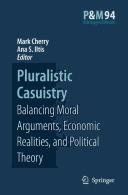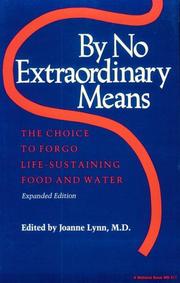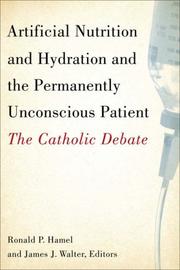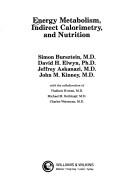| Listing 1 - 8 of 8 |
Sort by
|

ISBN: 1281138045 9786611138042 1402062079 1402062060 9048175674 Year: 2008 Volume: 93 5 Publisher: Dordrecht : Springer,
Abstract | Keywords | Export | Availability | Bookmark
 Loading...
Loading...Choose an application
- Reference Manager
- EndNote
- RefWorks (Direct export to RefWorks)
Pope John Paul II surprised much of the medical world in 2004 with his strongly worded statement insisting that patients in a persistent vegetative state should be provided with nutrition and hydration. While many Catholic bioethicists defended the Pope’s claim that the life of all human beings, even those in a persistent vegetative state or a coma, was worth protecting, others argued that the Pope’s position marked a shift from the traditional Catholic teaching on the withdrawal of medical treatment at the end of life. The debate among Catholic bioethicists over the Pope’s statement only grew more intense during the controversy surrounding Terry Schiavo’s death in 2005, as bioethicists on both sides of the debate argued about the legitimacy of removing her feeding tubes. This collection of essays by some of the most prominent Catholic bioethicists addresses the Pope’s statements, the moral issues surrounding artificial feeding and hydration, the refusal of treatment, and the ethics of care for those at the end of life.
Artificial feeding --- Moral and ethical aspects. --- Artificial nutrition --- Feeding, Artificial --- Nutrition --- Medical ethics. --- Religion. --- Ethics. --- Philosophy. --- Medicine-Philosophy. --- Theory of Medicine/Bioethics. --- Religious Studies, general. --- Philosophy of Religion. --- Philosophy of Medicine. --- Medicine --- Mental philosophy --- Humanities --- Deontology --- Ethics, Primitive --- Ethology --- Moral philosophy --- Morality --- Morals --- Philosophy, Moral --- Science, Moral --- Philosophy --- Values --- Religion, Primitive --- Atheism --- God --- Irreligion --- Religions --- Theology --- Biomedical ethics --- Clinical ethics --- Ethics, Medical --- Health care ethics --- Medical care --- Bioethics --- Professional ethics --- Nursing ethics --- Social medicine --- Medical logic --- Moral and ethical aspects --- Health Workforce --- Religion—Philosophy. --- Medicine—Philosophy.

ISBN: 0585163006 9780585163000 0253205174 Year: 1989 Publisher: Bloomington, Ind. Indiana University Press
Abstract | Keywords | Export | Availability | Bookmark
 Loading...
Loading...Choose an application
- Reference Manager
- EndNote
- RefWorks (Direct export to RefWorks)
Terminal care --- Artificial feeding --- Dehydration (Physiology) --- Ethics, Medical. --- Euthanasia. --- Euthanasia, Passive. --- Terminal Care --- End of Life Care --- End-Of-Life Care --- Care, End-Of-Life --- Care, Terminal --- End-Of-Life Cares --- Death --- Advance Care Planning --- Euthanasia, Negative --- Negative Euthanasia --- Passive Euthanasia --- Allowing to Die --- Resuscitation Orders --- Euthanasia, Active --- Mercy Killing --- Killing, Mercy --- Killings, Mercy --- Mercy Killings --- Right to Die --- Suicide, Assisted --- Bioethical Issues --- Medical Ethics --- Medicine --- Professionalism --- Bioethics --- Body water loss --- Water-electrolyte imbalances --- Artificial nutrition --- Feeding, Artificial --- Nutrition --- Moral and ethical aspects. --- Prevention --- legislation. --- ethics --- #GBIB:CBMER --- #GROL:SEMI-241.63*2 --- Moral and ethical aspects --- Prevention&delete&

ISBN: 1589012429 1435627253 9781435627253 9781589012424 9781589011786 1589011783 Year: 2007 Publisher: Washington, D.C. Georgetown University Press
Abstract | Keywords | Export | Availability | Bookmark
 Loading...
Loading...Choose an application
- Reference Manager
- EndNote
- RefWorks (Direct export to RefWorks)
During the past few decades, high-profile cases like that of Terry Schiavo have fueled the public debate over forgoing or withdrawing artificial nutrition and hydration from patients in a persistent vegetative state (PVS). These cases, whether involving adults or young children, have forced many to begin thinking in a measured and careful way about the moral legitimacy of allowing patients to die. Can families forgo or withdraw artificial hydration and nutrition from their loved ones when no hope of recovery seems possible?Many Catholics know that Catholic moral theology has formulated a well-
Religion and Medicine. --- Persistent Vegetative State --- Fluid Therapy --- Enteral Nutrition --- Catholicism. --- Euthanasia, Passive --- Euthanasia --- Artificial feeding. --- Fluid therapy --- Loss of consciousness. --- Persistent vegetative state --- Medical ethics. --- Fluid replacement therapy --- Fluids --- Therapeutics --- Water-electrolyte balance (Physiology) --- Blackouts (Loss of consciousness) --- Consciousness, Loss of --- Insensibility --- Unconscious state --- Unconsciousness --- Neurologic manifestations of general diseases --- Biomedical ethics --- Clinical ethics --- Ethics, Medical --- Health care ethics --- Medical care --- Medicine --- Bioethics --- Professional ethics --- Nursing ethics --- Social medicine --- Minimally conscious state --- Permanent vegetative state --- Persistent unawareness state --- Post-traumatic vegetative state --- Posttraumatic vegetative state --- PVS (Persistent vegetative state) --- Unawareness state, Persistent --- Vegetative state, Persistent --- Brain damage --- Loss of consciousness --- Coma --- Artificial nutrition --- Feeding, Artificial --- Nutrition --- Roman Catholic Ethics --- Roman Catholicism --- Roman Catholics --- Catholic, Roman --- Catholicism, Roman --- Catholics, Roman --- Ethic, Roman Catholic --- Ethics, Roman Catholic --- Roman Catholic --- Roman Catholic Ethic --- Medicine and Religion --- Parish Nursing --- therapy. --- ethics. --- Moral and ethical aspects. --- Religious aspects --- Catholic Church. --- Therapeutic use --- Moral and ethical aspects --- Patients --- Religious aspects. --- Health Workforce --- Comatose state
Book
ISBN: 1606507346 9781606507346 1606507338 9781606507339 9781606507339 1606509225 Year: 2016 Publisher: New York [New York] (222 East 46th Street, New York, NY 10017)
Abstract | Keywords | Export | Availability | Bookmark
 Loading...
Loading...Choose an application
- Reference Manager
- EndNote
- RefWorks (Direct export to RefWorks)
Can food really take the place of medicine? While modern medicine certainly has its place and does more than its fair share of good, there is no denying that many of society's most perilous chronic diseases are exacerbated by poor diets. Whereas infectious diseases used to cause the most number of deaths, the impact of chronic diseases now far overshadows that of infectious diseases. Diet plays a significant role in the development of a number of types of chronic disease, such as heart disease, diabetes, and certain types of cancer. This title explores the impact of dietary choices on the prevention, management, and treatment of a number of medical conditions and disease states including cardiovascular disease, diabetes and metabolic stress, critical illness, cancer, and HIV/AIDS. Conditions of the gastrointestinal tract, musculoskeletal disorders, rheumatic disease, anemias, hepatobiliary, gallbladder, pancreatic and kidney diseases are covered in the subsequent title Diet and Disease II.
Diet therapy. --- Heart --- Diabetes --- Cancer --- AIDS (Disease) --- Nutritional Support. --- Diet Therapy. --- Heart Diseases --- Diabetes Mellitus --- Neoplasms --- Acquired Immunodeficiency Syndrome --- Diet Modification --- Therapy, Diet --- Diet Therapy, Restrictive --- Dietary Modification --- Dietary Restriction --- Restriction Diet Therapies --- Restriction Diet Therapy --- Restrictive Diet Therapies --- Restrictive Diet Therapy --- Diet Modifications --- Diet Therapies --- Diet Therapies, Restriction --- Diet Therapy, Restriction --- Dietary Modifications --- Dietary Restrictions --- Modification, Diet --- Modification, Dietary --- Restriction, Dietary --- Therapy, Restriction Diet --- Therapy, Restrictive Diet --- Diet --- Disease --- Artificial Feeding --- Feeding, Artificial --- Support, Nutritional --- Acquired immune deficiency syndrome --- Acquired immunodeficiency syndrome --- Acquired immunological deficiency syndrome --- HIV infections --- Immunological deficiency syndromes --- Virus-induced immunosuppression --- Clinical nutrition --- Diet and disease --- Dietotherapy --- Food --- Medical nutrition therapy --- MNT (Medical nutrition therapy) --- Nutrition therapy --- Dietetics --- Therapeutics, Physiological --- Diseases --- diet therapy. --- therapeutic use --- diet therapy --- Nutritional aspects --- Treatment --- Therapeutic use --- diet and disease --- nutrition care process --- diabetes --- diabetic diet --- metabolic stress --- heart disease --- heart healthy diet
Book
ISBN: 9781461478362 1461478375 9781461478379 1785396684 1461478367 1461478383 Year: 2015 Publisher: New York, NY : Springer New York : Imprint: Springer,
Abstract | Keywords | Export | Availability | Bookmark
 Loading...
Loading...Choose an application
- Reference Manager
- EndNote
- RefWorks (Direct export to RefWorks)
Finding all the information necessary to treat or meet the nutritional requirements of patients who are severely ill or establish new protocols has historically been problematic. This is addressed in Diet and Nutrition in Critical Care. This major reference work encapsulates the latest treatments and procedures to meet the dietary and nutritional needs of the critically ill. Where evidence is available this is presented. However, where evidence is absent, the authors highlight this and provide guidance based on their analysis of other available data and their clinical experience. Diet and Nutrition in Critical Care is a two volume set which addresses the needs of all those concerned with diet and nutrition in the critically ill and covers General Aspects, Enteral Aspects, and Parenteral Aspects. Each volume is stand alone and is further divided into separate sections. The Sections in the General Aspects are: General conditions in the severely ill General metabolic effects and treatments Assessment protocols General nutritional aspects Specific nutrients Adverse aspects The next two volumes Enteral Aspects and Parenteral Aspects contain the following sections: General aspects and methods Specific nutrients Specific conditions Adverse aspects and outcomes Comparisons or dual parenteral and enteral support or transitions Preclinical studies The authors recognise the limitations in simplistic divisions and there is always difficulty in categorising treatment regimens. For example, some regimens involve transitions from one feeding protocol to another or the development of co-morbid conditions and in some cases enteral support may be supplemented with parenteral support. This complexity however, is addressed by the excellent indexing system. Contributors are authors of international and national standing, leaders in the field and trendsetters. Emerging fields of science and important discoveries relating to artificial support will also be incorporated into Diet and Nutrition in Critical Care. This volume represents a one stop shop of material related to enteral and parenteral support and is essential reading for those specialising in intensive and critical care, dietitians, nutritionists, gastroenterologists, cardiologists, pharmacologists, health care professionals, research scientists, molecular or cellular biochemists, general practitioners as well as those interested in diet and nutrition in general.
Medicine & Public Health. --- Clinical Nutrition. --- Intensive / Critical Care Medicine. --- Complementary & Alternative Medicine. --- Nutrition. --- Medicine. --- Alternative medicine. --- Critical care medicine. --- Personal health and hygiene. --- Médecine --- Nutrition --- Médecines parallèles --- Soins intensifs --- Diet therapy --- Diet in disease --- Artificial feeding --- Critical care medicine --- Nutritional Support --- Critical Care --- Patient Care --- Nutrition Therapy --- Therapeutics --- Analytical, Diagnostic and Therapeutic Techniques and Equipment --- Diet & Clinical Nutrition --- Health & Biological Sciences --- Therapy --- Treatment --- Therapeutic --- Therapies --- Treatments --- Disease --- Medical Nutrition Therapy --- Nutrition Therapy, Medical --- Therapy, Medical Nutrition --- Therapy, Nutrition --- Informal care --- Care, Patient --- Informal cares --- care, Informal --- cares, Informal --- Surgical Intensive Care --- Intensive Care --- Intensive Care, Surgical --- Care, Critical --- Care, Intensive --- Care, Surgical Intensive --- Artificial Feeding --- Feeding, Artificial --- Support, Nutritional --- Intensive care --- Intensive medicine --- Alimentation --- Food --- Artificial nutrition --- Diet and disease --- Disease, Diet in --- Sick --- Clinical nutrition --- Diet --- Dietotherapy --- Medical nutrition therapy --- MNT (Medical nutrition therapy) --- Nutrition therapy --- therapy --- Health aspects --- Therapeutic use --- Complementary medicine. --- Clinical nutrition. --- Complementary medicine --- Healing systems --- Systems, Healing --- Systems, Therapeutic --- Therapeutic systems --- Medicine --- Integrative medicine --- Health --- Physiology --- Dietetics --- Digestion --- Food habits --- Malnutrition --- Clinical sciences --- Medical profession --- Human biology --- Life sciences --- Medical sciences --- Pathology --- Physicians --- Therapeutics, Physiological --- Emergency medicine --- Intensive care units --- Nutrition .
Periodical
ISSN: 13631950 Year: 1998 Publisher: London Lippincott Williams and Wilkins,.
Abstract | Keywords | Export | Availability | Bookmark
 Loading...
Loading...Choose an application
- Reference Manager
- EndNote
- RefWorks (Direct export to RefWorks)
Nutritional Physiological Phenomena. --- Metabolism. --- Clinical Medicine. --- Nutrition Disorders. --- Nutritional Support. --- Artificial Feeding --- Feeding, Artificial --- Support, Nutritional --- Nutritional Disorders --- Nutrition Disorder --- Nutritional Disorder --- Medicine, Clinical --- Metabolic Phenomenon --- Metabolic Process --- Metabolism Concepts --- Metabolism Phenomena --- Process, Metabolic --- Processes, Metabolic --- Anabolism --- Catabolism --- Metabolic Concepts --- Metabolic Phenomena --- Metabolic Processes --- Concept, Metabolic --- Concept, Metabolism --- Concepts, Metabolic --- Concepts, Metabolism --- Metabolic Concept --- Metabolism Concept --- Phenomena, Metabolic --- Phenomena, Metabolism --- Phenomenon, Metabolic --- Nutrition Phenomena --- Nutrition Physiological Concepts --- Nutrition Physiological Phenomenon --- Nutrition Process --- Nutritional Phenomena --- Nutritional Physiological Phenomenon --- Nutritional Physiology --- Nutritional Physiology Concepts --- Nutritional Physiology Phenomenon --- Nutritional Process --- Nutritional Processes --- Nutrition Physiological Phenomena --- Nutrition Physiology --- Nutrition Processes --- Nutritional Physiology Phenomena --- Concept, Nutrition Physiological --- Concept, Nutritional Physiology --- Concepts, Nutrition Physiological --- Concepts, Nutritional Physiology --- Nutrition Physiological Concept --- Nutritional Physiology Concept --- Phenomena, Nutrition --- Phenomena, Nutrition Physiological --- Phenomena, Nutritional --- Phenomena, Nutritional Physiological --- Phenomena, Nutritional Physiology --- Phenomenon, Nutrition Physiological --- Phenomenon, Nutritional Physiological --- Phenomenon, Nutritional Physiology --- Physiological Concept, Nutrition --- Physiological Concepts, Nutrition --- Physiological Phenomena, Nutrition --- Physiological Phenomena, Nutritional --- Physiological Phenomenon, Nutrition --- Physiological Phenomenon, Nutritional --- Physiology Concept, Nutritional --- Physiology Concepts, Nutritional --- Physiology Phenomena, Nutritional --- Physiology Phenomenon, Nutritional --- Physiology, Nutrition --- Physiology, Nutritional --- Process, Nutrition --- Process, Nutritional --- Processes, Nutrition --- Processes, Nutritional --- Food --- Nutritional Sciences --- Phototrophic Processes --- Autotrophic Processes --- Heterotrophic Processes --- Chemoautotrophic Growth --- Periodicals --- Health Sciences --- Life Sciences --- General and Others --- Pharmacy and Pharmacology --- Genetics --- Metabolism --- Nutritional Physiological Phenomena --- Clinical Medicine --- Nutrition Disorders --- Nutritional Support

ISBN: 9781589011786 1589011783 Year: 2007 Publisher: Washington Georgetown university press
Abstract | Keywords | Export | Availability | Bookmark
 Loading...
Loading...Choose an application
- Reference Manager
- EndNote
- RefWorks (Direct export to RefWorks)
During the past few decades, high-profile cases like that of Terry Schiavo have fueled the public debate over forgoing or withdrawing artificial nutrition and hydration from patients in a persistent vegetative state (PVS). These cases, whether involving adults or young children, have forced many to begin thinking in a measured and careful way about the moral legitimacy of allowing patients to die. Can families forgo or withdraw artificial hydration and nutrition from their loved ones when no hope of recovery seems possible?Many Catholics know that Catholic moral theology has formulated a well-
Christian moral theology --- Professional ethics. Deontology --- Artificial feeding. --- Coma --- Euthanasia --- Fluid therapy --- Loss of consciousness. --- Medical ethics. --- Persistent vegetative state --- Religion and medicine. --- Euthanasia, Passive --- Catholicism --- Catholicism. --- Enteral Nutrition --- Fluid Therapy --- Persistent Vegetative State --- Religion and Medicine --- Religion and Medicine. --- Patients --- Religious aspects --- Moral and ethical aspects. --- Catholic Church. --- ethics --- ethics. --- therapy --- therapy. --- -Loss of consciousness. --- -Religion and medicine. --- -Euthanasia, Passive --- 241.63*4 --- Medicine and Religion --- Parish Nursing --- Roman Catholic Ethics --- Roman Catholicism --- Roman Catholics --- Catholic, Roman --- Catholicism, Roman --- Catholics, Roman --- Ethic, Roman Catholic --- Ethics, Roman Catholic --- Roman Catholic --- Roman Catholic Ethic --- Assisted death (Euthanasia) --- Assisted dying (Euthanasia) --- Death, Assisted (Euthanasia) --- Death, Mercy --- Dying, Assisted (Euthanasia) --- Killing, Mercy --- Mercy death --- Mercy killing --- Homicide --- Medical ethics --- Assisted suicide --- Right to die --- Medicine and religion --- Religion and medicine --- Pastoral medicine --- Fluid replacement therapy --- Fluids --- Therapeutics --- Water-electrolyte balance (Physiology) --- Blackouts (Loss of consciousness) --- Consciousness, Loss of --- Insensibility --- Unconscious state --- Unconsciousness --- Neurologic manifestations of general diseases --- Comatose state --- Loss of consciousness --- Biomedical ethics --- Clinical ethics --- Ethics, Medical --- Health care ethics --- Medical care --- Medicine --- Bioethics --- Professional ethics --- Nursing ethics --- Social medicine --- -Religious aspects --- -Catholicism. --- Theologische ethiek: euthanasie --- Therapeutic use --- Moral and ethical aspects --- Artificial feeding --- Feeding Methods --- Christianity --- Drug Therapy --- Brain Damage, Chronic --- Morals --- Withholding Treatment --- Nutritional Support --- Religion --- Patient Care --- Terminal Care --- Brain Diseases --- Psychology, Social --- Consciousness Disorders --- Humanities --- Nutrition Therapy --- Neurobehavioral Manifestations --- Central Nervous System Diseases --- Behavior and Behavior Mechanisms --- Analytical, Diagnostic and Therapeutic Techniques and Equipment --- Health Services --- Health Care Facilities, Manpower, and Services --- Neurologic Manifestations --- Nervous System Diseases --- Psychiatry and Psychology --- Signs and Symptoms --- Health Care --- Diseases --- Pathological Conditions, Signs and Symptoms --- Ethics --- Health & Biological Sciences --- Pathology --- Catholic Church --- 241.63*4 Theologische ethiek: euthanasie --- Minimally conscious state --- Permanent vegetative state --- Persistent unawareness state --- Post-traumatic vegetative state --- Posttraumatic vegetative state --- PVS (Persistent vegetative state) --- Unawareness state, Persistent --- Vegetative state, Persistent --- Brain damage --- Artificial nutrition --- Feeding, Artificial --- Nutrition --- Religious aspects&delete& --- Religiosity Coping --- Spiritual Coping --- Coping, Religiosity --- Coping, Spiritual --- Religiosity Copings

ISBN: 0683011413 Year: 1989 Publisher: Bethesda Williams and Wilkins
Abstract | Keywords | Export | Availability | Bookmark
 Loading...
Loading...Choose an application
- Reference Manager
- EndNote
- RefWorks (Direct export to RefWorks)
Calorimetry. --- Energy Metabolism. --- Enteral Nutrition. --- Nutritional Physiological Phenomena. --- Parenteral Nutrition. --- 613.2 --- Artificial feeding --- Energy metabolism --- -Indirect calorimetry --- Nutrition --- Alimentation --- Food --- Health --- Physiology --- Diet --- Dietetics --- Digestion --- Food habits --- Malnutrition --- Respiration calorimetry --- Calorimetry --- Bioenergetics --- Metabolism --- Microbial respiration --- Artificial nutrition --- Feeding, Artificial --- Intravenous Feeding --- Nutrition, Parenteral --- Parenteral Feeding --- Feeding, Intravenous --- Feeding, Parenteral --- Feedings, Intravenous --- Feedings, Parenteral --- Intravenous Feedings --- Parenteral Feedings --- Parenteral Nutrition Solutions --- Nutrition Phenomena --- Nutrition Physiological Concepts --- Nutrition Physiological Phenomenon --- Nutritional Phenomena --- Nutritional Physiological Phenomenon --- Nutritional Physiology --- Nutritional Physiology Concepts --- Nutritional Physiology Phenomenon --- Nutrition Physiological Phenomena --- Nutrition Physiology --- Nutritional Physiology Phenomena --- Concept, Nutrition Physiological --- Concept, Nutritional Physiology --- Concepts, Nutrition Physiological --- Concepts, Nutritional Physiology --- Nutrition Physiological Concept --- Nutritional Physiology Concept --- Phenomena, Nutrition --- Phenomena, Nutrition Physiological --- Phenomena, Nutritional --- Phenomena, Nutritional Physiological --- Phenomena, Nutritional Physiology --- Phenomenon, Nutrition Physiological --- Phenomenon, Nutritional Physiological --- Phenomenon, Nutritional Physiology --- Physiological Concept, Nutrition --- Physiological Concepts, Nutrition --- Physiological Phenomena, Nutrition --- Physiological Phenomena, Nutritional --- Physiological Phenomenon, Nutrition --- Physiological Phenomenon, Nutritional --- Physiology Concept, Nutritional --- Physiology Concepts, Nutritional --- Physiology Phenomena, Nutritional --- Physiology Phenomenon, Nutritional --- Physiology, Nutrition --- Physiology, Nutritional --- Nutritional Sciences --- Gastric Feeding Tubes --- Enteral Feeding --- Force Feeding --- Nutrition, Enteral --- Tube Feeding --- Feeding Tube, Gastric --- Feeding Tubes, Gastric --- Feeding, Enteral --- Feeding, Force --- Feeding, Tube --- Feedings, Force --- Force Feedings --- Gastric Feeding Tube --- Tube, Gastric Feeding --- Tubes, Gastric Feeding --- Energy Expenditure --- Bioenergetic --- Energy Expenditures --- Energy Metabolisms --- Expenditure, Energy --- Expenditures, Energy --- Metabolism, Energy --- Metabolisms, Energy --- Basal Metabolism --- Hot Temperature --- Transition Temperature --- Voedingsleer. Dieet --- Measurement --- Health aspects --- Nutrition Process --- Nutritional Process --- Nutritional Processes --- Nutrition Processes --- Process, Nutrition --- Process, Nutritional --- Processes, Nutrition --- Processes, Nutritional --- Phototrophic Processes --- Autotrophic Processes --- Heterotrophic Processes --- Chemoautotrophic Growth --- Indirect calorimetry --- Energy Metabolism --- Enteral Nutrition --- Nutritional Physiological Phenomena --- Parenteral Nutrition --- Calorimetry, indirect --- Enteral feeding
| Listing 1 - 8 of 8 |
Sort by
|

 Search
Search Feedback
Feedback About UniCat
About UniCat  Help
Help News
News